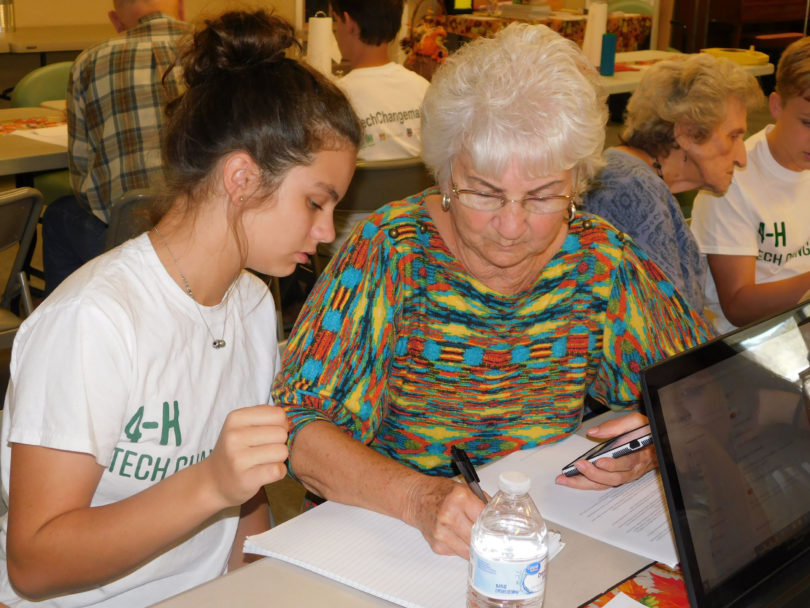In rural Georgia counties, STEAM programs are having an impact on kids, teenagers and adults. STEAM is designed to integrate science, technology, engineering and mathematics (STEM – the “A” stands for Art) subjects into various education disciplines. The goal is to teach students how to think critically and use engineering or technology in creative approaches to real-world problems while building on students’ mathematics and science base.
University of Georgia Cooperative Extension 4-H agent Randie Gray is teaching students about STEAM-based careers in a 4-H county day camp held on Wednesdays during July.
Working closely with Hancock County children through the Georgia 4-H program, Gray’s goal is to help introduce them to new opportunities. She spent two months selecting lesson plans that engage youth with fun, hands-on activities, from incubating chickens to making bubble gum and model airplanes.
“I think STEAM is a way to break that cycle of poverty where they can get 21st-century jobs,” Gray said. “I think in a small county like Hancock, there’s not a lot to do, not a lot of options for the kids compared to those who live in urban counties.”
Close to 80 youths attended last year’s camp, which was taught by 4-H team leaders and two adult volunteers.
Kids teaching adults
While Hancock County uses STEAM to prepare today’s youth for tomorrow’s opportunities, four counties in northwest Georgia have joined forces to form Tech Changemakers. Created through a grant from Microsoft and the National 4-H Council, the program is designed for youth to teach digital literacy skills to adults.
Stephanie Skojac, the UGA Extension 4-H agent in Murray County partnered with the local senior center last Fall to hold monthly classes taught by 4-H youths. The students taught 15 adult students how to grocery shop online, to use Facebook and to use video-calling services like Skype and Facetime.
“The adults loved it and such a high number of students came every month; it amazed me,” Skojac said. “We had T-shirts made that say 4-H Tech Changemakers and all the students are proud to wear their shirts. I’m really impressed with the program.”
About 25 4-H students participated each month, and the senior center has requested the program be offered again this year.
As broadband internet access continues to improve in rural communities, these adults will now be more equipped to use the resources at their disposal, Skojac said. Georgia 4-H members in Catoosa, Gordon and Whitfield counties have joined the program this year.
“I think with this particular initiative, companies are realizing that it is important for our whole population to have STEAM skills, so we’re flipping the model. Instead of having adults teach youth, we’re having the youth teach the adults,” said Allie Griner, UGA Extension 4-H agent in Gordon County. “How to get an email address is a very simple concept for some of us, but for adults not used to technology it’s a huge thing to be able to do that.”
STEAM sparks love for engineering
Georgia high school senior Madison Moore is using her experience in STEAM to educate others in Emanuel County about its value.
A student at Swainsboro High School in Emanuel County, Moore has developed a love and passion for engineering through the STEAM curriculum at her school.
An active 4-H member, Moore integrated both of her passions by becoming a 4-H STEAM ambassador. She attended a training camp last summer to learn what an ambassador does and how to teach children.
One of the requirements for an ambassador is to complete six learning and six sharing experiences. One of her sharing experiences centered on teaching engineering-focused STEAM lessons to youth in her county.
She created a STEAM club through 4-H to spread her knowledge and love of STEAM to students in elementary and middle schools. They met once a month this past school year, and Moore taught lessons about the engineering design process, aerodynamics, inertia and kinetic and potential energy. She also led hands-on activities like building rockets, making a volcano and launching a catapult.
“I really enjoy presenting these kids with the opportunity to learn these kinds of things that I wished I could have learned when I was their age,” Moore said. “I hope to fill their minds with knowledge, which will hopefully fuel their passion for STEAM as well.”
Moore plans to attend Kennesaw State University to pursue a career as a drafter or civil engineer.
“Engineering has really had a huge impact on my life. It has helped me find out who I was and become who I am now,” Moore said. “I believe that engineering and technology education is important because it impacts everyone. Everything you see around you was created by an engineer — from your cellular device to this building.”
In three years of engineering education, Moore developed leadership and problem-solving skills and learned how to use power tools. Following the STEAM pathway also earned her a diploma seal for completing the Technology and Engineering pathway at Swainsboro High.
“By exposing students to STEAM and giving them opportunities to explore different STEAM-related concepts, they will have a chance to develop a passion for it and hopefully decide to pursue a job in a STEAM field,” Moore said. “A curriculum that is STEAM-based has real-life situations to help the student learn.”







